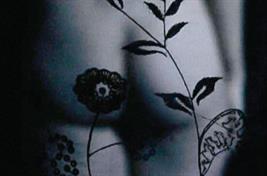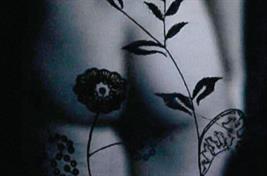 Erotica is all skinny blondes, mountainous mammaries and throbbing members right? Well it doesn’t have to be, and good erotica often isn’t.
Erotica is all skinny blondes, mountainous mammaries and throbbing members right? Well it doesn’t have to be, and good erotica often isn’t.
I talk to author Krissy Kneen about gender stereotypes, clichés and scribing good sex.
The Brisbane-based author burst onto the scene with her memoir Affection, which dispelled many myths about erotic writing. Proving that writing sex isn’t always smut, the book was shortlisted for Biography of the Year by the ABIA and the non-fiction award of the QLD Premier’s Literary Awards in 2010. Interesting because unlike most works of erotica, Affection isn’t fiction.
That’s one of the main problems with erotica that Kneen will tackle in a series of workshops at upcoming writers’ festivals, including Eye of the Storm in Alice Springs, Sydney Writers’ Festival and Brisbane Writers Festival.
‘A lot of mainstream erotic books are actually just taking stereotypes and throwing them back at people. People are quite used to accepting those images and that’s something I find problematic. Literature is a place where you can challenge and explore alternatives to that,’ she explains.
These stereotypes have oozed into our everyday lives. From Internet pornography to advertising, we’re saturated with sexual stereotypes that are often completely fictitious and gender-biased.
‘Pass any billboard and if it’s using sex to sell something, and normally it is, it’s going to be a young, thin woman, scantily clad, and that’s representative of how we look at sexuality, which is really driven by young heterosexual men. I have huge problems with the way our society deals with gender and sexuality, alternative sexualities and our relationship to sex only being allowed to be the sphere of the young and attractive.’
Not that Kneen has a problem with sex, or pornography. Aside from Affection, she’s also penned a pornographic series of novellas called Triptych, but she does have a problem with the dominatrixes of erotica, E.L. James (Fifty Shades of Grey) and Nikki Gemmel (The Bride Stripped Bare).
But their incredibly popular books aren’t the scribbles of horny schoolboys, so what’s the problem?
‘Fifty Shades of Grey is definitely leaning towards the stereotype, despite the fact it’s supposed to be this transgressive S&M novel. It’s not transgressive at all, it’s a story about a virgin using her sexuality to hook a man, marry him and turn his red room of pain into a baby’s room,’ she says. ‘So really it’s aimed at stopping people from having different sexualities and forcing them into a heterosexual monogamous norm.’
The Bride Stripped Bare is similarly problematic. According to Kneen, the book suggests that ‘if you ever have any alternative sexuality, as in The Bride Stripped Bare, you die at the end of the book’. In Gemmel’s follow-up With My Body, the ‘sexy S&M period’ of the protagonist’s youth is taught to be an ‘anomaly and she has to learn that in the end, the sexiest sex is the sex you have to make children’.
‘That’s not true!’ Kneen laments. ‘For everyone I know that’s trying to have children it’s about temperature and clocks and timing, there’s nothing sexy about that – unless that’s what you’re into. It’s more than that, sexuality is about women’s pleasure as much as it is about men’s pleasure, and it’s not about only finding pleasure in having sex to have children.’
After talking with Kneen, you get the sense that ‘what you’re into’ can be damn near anything yet most of us still infer our ideas of intimacy and sexuality from societal norms. That’s something that she’s tried to transgress in Triptych, which despite being pornographic, has very much an intellectual approach.
‘Each of those novellas deals with a different taboo, and to look at taboos and try to lure a reader across the line of what they’re comfortable with, so at some point in the reading they’re like “hang on, I’ve just been aroused by something that I shouldn’t be aroused by”, and that looks at the ethics of why you draw a particular line [in sexuality], where those lines are and then throws that into question.’
This intellectual engagement isn’t surprising when you consider Kneen’s first reading of sexuality was in George Orwell’s 1984, which is surprising. ‘That was a banned book in my home because of the sexuality in it, not because of the political content,’ she remembers.
Of course, at the time there was another banned book that was secretly disseminated amongst teenagers, Anais Nin’s Delta of Venus, which she encountered when she was 16. The facts these books were banned inevitably heightened the pleasure of reading them, but literature wasn’t the only thing banned at home nor the only influence on her career as an author of erotica.
‘Most people in their home environment learn what’s okay to speak publicly about sex and what isn’t okay to talk about. Because there was absolutely no mention of sexuality at home, when I left I realised ‘Oh other people can talk about sex’, and I didn’t know there were lines they weren’t crossing [when talking about it].’
Because she didn’t know the lines, she didn’t know she was crossing them and now enjoys toying with the parameters of sex in her books. ‘People are a bit hesitant talking about sexuality, but for me that wasn’t the case, I didn’t know where to stop and I think I just got into a habit,’ she says.
This is something that she’ll have to consider when the workshops got underway. While Kneen has no problem revealing her sex life, many people are squeamish about exposing themselves. To navigate this sensitive subject, participants will read passages ‘to break the ice’ from ‘really beautiful works from the masters of sex writing’.
Who are those masters? Well there’s Nin, but in keeping with Kneen’s interest in transgressing our ingrained (probably boring) approach to sexuality, there’s also the Marquis de Sade, who she admits is ‘incredibly perverse’ but broke the mould and ‘looked at the fun of sex’.
Also on the list are surrealist author George Bataille, who is ‘quite shocking but interesting in terms of the psychological reaction to sex’, and James Salter, whose book Sport and a Pastime, is one of her favourite books about sexuality.
But the workshop is more than cataloguing the literary commanders of copulation; it also teaches budding writers how to steer clear of engorged love buttons, milky thighs and longhaired lotharios.
‘We’ll also be looking at some old 80s stick mags and reading out the language in that and what’s problematic about stereotypical porn speak, the clichés they use and the problems with looking at sex in that way.’
But onto those lotharios, he who graces the cover of many a supermarket paperback. According to Kneen, that stereotype, along with the buxom blonde, is ‘uninteresting’ because of their recycled, clichéd use. Writing a character ‘who is a bit different’ is a better option, and adds an element of sexuality.
That idea of different in this context could actually stand for normal. We’re not all porno actors or fashion models and those stereotypes are what’s different. These images don’t represent the majority of people (or fans of erotica), who aren’t perfect but human and humanity is at the crux of all good writing.
‘If the reader can see themselves in the flaws that you’ve managed to put into your work, then you’ve connected with them sexually, and that’s half the battle. If it’s completely about someone being incredibly attractive and good in bed, that’s not going to connect with a reader.’
Resisting fetishisation is an important aspect to writing erotica, which when handled properly has the potential to be empowering as well as arousing. Kneen believes that other key features include understanding and appreciating your own sexuality, not being afraid to ‘be ugly in your work’ and having the courage to know you have failings.
‘Being comfortable with your own failings is part of being a good sex writer. If you’re in touch with the sexy side and the unsexy side of yourself, you can balance the two and make it more human.’
This also lowers the risk of dissatisfaction amongst those that feel their normal lives don’t live up to the rollicking adventures in mainstream erotica. ‘The more we can make people feel sexy within themselves, then that’s when we’ve achieved something. Hopefully writers will leave these workshops knowing more about their own sexuality, and knowing how to connect with an ordinary reader to make them feel good.’
This article first appeared on artsHub on April 24.
